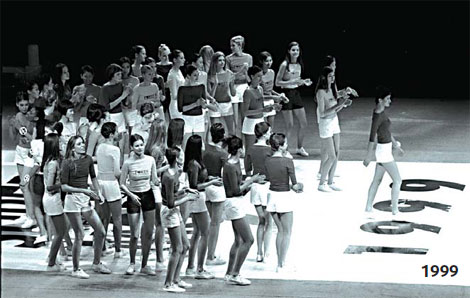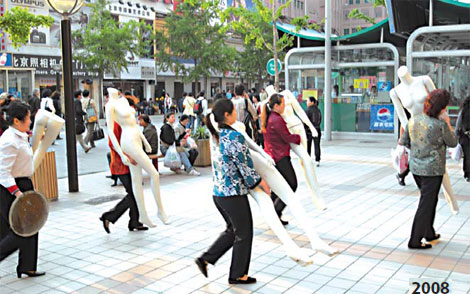
|
BIZCHINA> Wen's Lens
 |
|
Related
Ready-to-wear
By You Nuo (China Daily)
Updated: 2008-11-10 13:51    Made-in-China garments and textiles may still be favored items for middle-class shoppers during the current financial crisis. But while choosing between the large quantities and varieties of domestic supplies, perhaps very few can remember that 30 years ago China was nicknamed the country of "blue ants" in the international press. The reference was to the teeming masses of Chinese citizens seemingly all clad in ubiquitous blue trousers and jackets. That was a time when few billboards existed, except for those with political slogans. Shop windows usually had few items on display, and certainly not for fashion. Chinese cities actually had only one basic clothing style. That has been well-documented, though not statistically, but by thousands of old photos including ones that have run in this column. It took around two decades, between the 1980s and '90s, for urban Chinese to revamp their wardrobes. And indeed that was the time when many families began to own their first colorful wardrobes. Even farmers threw away their old clothes made from black coarse cloth cut from the pre-industrial age. Commercial campaigns for fashion began to spread in the cities - from the large coastal ones to the smaller ones in the inland areas. At the time our black-and-white photo was taken, this country was growing into one of the major exporters of (mainly inexpensive) garments and textiles in the world. But the change was not just an increase in production or variety. It is not just a success story of an industry. The flourishing garment market was an example of the spread of all sorts of commercial operations and how much difference they made. There may not seem much of a relationship from importing fashion shows, as shown in our black-and-white photo taken in 1999 - which must have been one of the earliest ones in the country - to sales staff carrying plastic mannequins across the street as seen in our 2008 color photo. From a marketing point of view, the fashion shows that feature international models are rare, glitzy events that take place in expensive locales. Whereas constantly re-arranging displays in shop windows and putting out temporary demonstrations on sidewalks, as people in the 2008 photo might be doing, shows the world of ordinary shops and consumers. The two photos show both ends of a learning process which originates in the metropolitan centers and permeates daily life with an offer to appreciate more choices. But it is far from complete yet. It was only recently, for instance, that the concept of branding began to sow its seeds in Chinese society. The Chinese still don't own many international garment brands yet.
(For more biz stories, please visit Industries)
|